高级英语修辞总结
- 格式:docx
- 大小:20.17 KB
- 文档页数:8
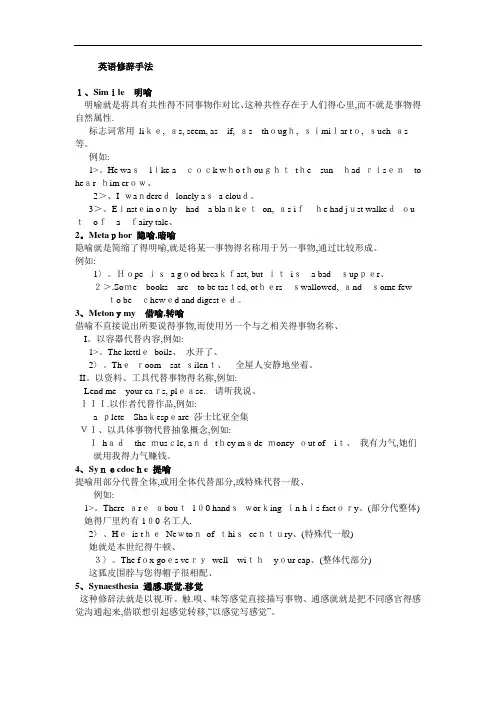
英语修辞手法1、Simile明喻明喻就是将具有共性得不同事物作对比、这种共性存在于人们得心里,而不就是事物得自然属性.标志词常用like, as, seem, as if, as though, similar to, such as 等。
例如:1>。
He waslike acock who thoughtthe sunhad risento hear him crow、2>、I wanderedlonely asa cloud。
3>。
Einstein only had a blanketon, as ifhe had just walkedou tofafairy tale、2。
Metaphor 隐喻,暗喻隐喻就是简缩了得明喻,就是将某一事物得名称用于另一事物,通过比较形成。
例如:1〉。
Hope isa good breakfast, but itis a badsupper、2>.Some books are to be tasted, othersswallowed, andsome few to bechewed and digested。
3、Metonymy借喻,转喻借喻不直接说出所要说得事物,而使用另一个与之相关得事物名称、I。
以容器代替内容,例如:1>。
The kettleboils、水开了、2〉。
Theroom sat silent、全屋人安静地坐着。
II。
以资料、工具代替事物得名称,例如:Lend me your ears, please.请听我说、III.以作者代替作品,例如:a plete Shakespeare 莎士比亚全集VI、以具体事物代替抽象概念,例如:Ihadthe muscle, andthey made money out of it、我有力气,她们就用我得力气赚钱。
4、Synecdoche 提喻提喻用部分代替全体,或用全体代替部分,或特殊代替一般、例如:1>。

高级英语修辞总结HUA system office room 【HUA16H-TTMS2A-HUAS8Q8-HUAH1688】Rhetorical Devices一、明喻(simile)是以两种具有相同特征的事物和现象进行对比,表明本体和喻体之间的相似关系,两者都在对比中出现。
常用比喻词like, as, as if, as though等,例如:1、This elephant is like a snake as anybody can see.这头象和任何人见到的一样像一条蛇。
2、He looked as if he had just stepped out of my book of fairytales and had passed me like a spirit.他看上去好像刚从我的童话故事书中走出来,像幽灵一样从我身旁走过去。
3、It has long leaves that sway in the wind like slim fingers reaching to touch something.它那长长的叶子在风中摆动,好像伸出纤细的手指去触摸什么东西似的。
二、隐喻(metaphor)这种比喻不通过比喻词进行,而是直接将用事物当作乙事物来描写,甲乙两事物之间的联系和相似之处是暗含的。
1、German guns and German planes rained down bombs, shells and bullets...德国人的枪炮和飞机将炸弹、炮弹和子弹像暴雨一样倾泻下来。
2、The diamond department was the heart and center of the store.钻石部是商店的心脏和核心。
三、Allusion(暗引)其特点是不注明来源和出处,一般多引用人们熟知的关键词或词组,将其融合编织在作者的话语中。
引用的东西包括典故、谚语、成语、格言和俗语等。
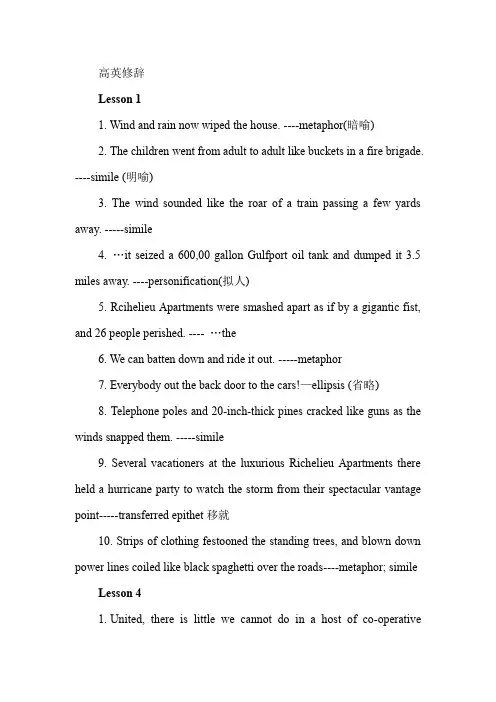
高英修辞Lesson 11. Wind and rain now wiped the house. ----metaphor(暗喻)2. The children went from adult to adult like buckets in a fire brigade. ----simile (明喻)3. The wind sounded like the roar of a train passing a few yards away. -----simile4. …it seized a 600,00 gallon Gulfport oil tank and dumped it 3.5 miles away. ----personification(拟人)5. Rcihelieu Apartments were smashed apart as if by a gigantic fist, and 26 people perished. ---- …the6. We can batten down and ride it out. -----metaphor7. Everybody out the back door to the cars!—ellipsis (省略)8. Telephone poles and 20-inch-thick pines cracked like guns as the winds snapped them. -----simile9. Several vacationers at the luxurious Richelieu Apartments there held a hurricane party to watch the storm from their spectacular vantage point-----transferred epithet移就10. Strips of clothing festooned the standing trees, and blown down power lines coiled like black spaghetti over the roads----metaphor; simile Lesson 41.United, there is little we cannot do in a host of co-operativeventures. Divided, there is little we can do, for we dare not meet a power full challenge at odds and split asunder.—antithesis2.Let us never negotiate out of fear, but let us never fear to negotiate.—regression (回环:A-B-C)3.All this will not be finished in the first one hundred days.—allusion 引典; climax递进4. And so, my fellow Americans ask not what your country can do for you; ask what you can do for your country.—antithesis, regression回环5.We observe today not a victory of party but a celebration of freedom, symbolizing an end as well as a beginning, signifying renewal as well as change. ----parallelism6.Let the word go forth from this time and place, to friend and foe alike….—alliteration7.Let every nation know, whether it wishes us well or i11, that we shall pay any price, bear any burden meet any hardship, support any friend, oppose any foe to assure the survival and the success of liberty. ----parallelism; alliteration8.United, there is little we cannot do in a host of co-operative ventures. Divided, there is little we can do, for we dare not meet a powerful challenge at odds and split asunder. ----antithesis对句9.If a free society cannot help the many who are poor, it cannot savethe few who are rich. -----antithesis10. …to assist free men and free governments in casting off the chains of poverty. ---repetition11. And if a beachhead of co-operation may push back the jungle of suspicion…----metaphor12. Let both sides explore what problems unite us instead of belaboring those problems which divide us -----antithesis13.And let every other power know that this hemisphere intends to remain the master of its own house.-----metaphor14. The energy, the faith, the devotion which we bring to this endeavor will light our country and all who serve it, and the glow from that fire can truly light the world. -----extended metaphor15. …to strengthen its shield of the new and the weak…----metaphor16.With a good conscience our only sure reward, with history the final judge of our deeds -----parallelismLesson101.The slightest mention of the decade brings nostalgic recollections to the middle-aged and curious questionings by the young: memories of the deliciously illicit thrill of the first visit to a speakeasy, of the brave denunciation of Puritan morality, and of the fashionable experimentations in amour in the parked sedan on a country road; questions about thenaughty, jazzy parties, the flask-toting”sheik”, and the moral and stylistic vagaries of the “flapper”and the “drug-store cowboy”.—transferred epithet2. Second, in the United States it was reluctantly realized by some—subconsciously if not openly—that our country was no longer isolated in either politics or tradition and that we had reached an international stature that would forever prevent us from retreating behind the artificial walls of a provincial morality or the geographical protection of our two bordering oceans.—metaphor3.War or no war, as the generations passed, it became increasingly difficult for our young people to accept standards of behavior that bore no relationship to the bustling business medium in which they were expected to battle for success.—metaphor4.The war acted merely as a catalytic agent in this breakdown of the Victorian social structure, and by precipitation our young people into a pattern of mass murder it released their inhibited violent energies which, after the shooting was over, were turned in both Europe and America to the destruction of an obsolescent nineteenth century society.—metaphor5.The prolonged stalemate of 1915-1916,the increasing insolence of Germany toward the United States, and our official reluctance to declare our status as a belligerent were intolerable to many of our idealistic citizens, and with typical American adventurousness enhanced somewhatby the strenuous jingoism of Theodore Roosevelt, our young men began to enlist under foreign flags.—metonymy6.Their energies had been whipped up and their naive destroyed by the war and now, in sleepy Gopher Prairies all over the country, they were being asked to curb those energies and resume the pose of self-deceiving Victorian innocence that they now felt to be as outmoded as the notion that their fighting had “made the world safe for democracy”.—metaphor7.After the war, it was only natural that hopeful young writers, their minds and pens inflamed against war, Babbittry, and”Puritanical”gentility, should flock to the traditional artistic center(where living was still cheap in 1919)to pour out their new-found creative strength, to tear down the old world, to flout ht morality of their grandfathers, and to give all to art, love, and sensation.—metonymy synecdoche8. Younger brothers and sisters of the war generation, who had been playing with marbles and dolls during the battles of Belleau Wood and Chateau-Thierry, and who had suffered no real disillusionment or sense of loss, now began to imitate the manners of their elders and play with the toys of vulgar rebellion.—metaphor9.These defects would disappear if only creative art were allowed to show the way to better things, but since the country was blind and deaf to everything save the glint and ring of the dollar, there was little remedy for the sensitive mind but to emigrate to Europe where”they do things精品文库better.”—personification, metonymy ,synecdoche。
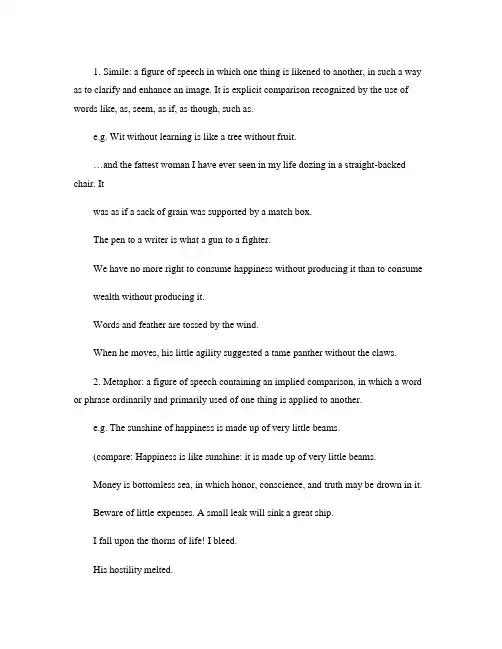
1. Simile: a figure of speech in which one thing is likened to another, in such a way as to clarify and enhance an image. It is explicit comparison recognized by the use of words like, as, seem, as if, as though, such as.e.g. Wit without learning is like a tree without fruit.…and the fattest woman I have ever seen in my life dozing in a straight-backed chair. Itwas as if a sack of grain was supported by a match box.The pen to a writer is what a gun to a fighter.We have no more right to consume happiness without producing it than to consumewealth without producing it.Words and feather are tossed by the wind.When he moves, his little agility suggested a tame panther without the claws.2. Metaphor: a figure of speech containing an implied comparison, in which a word or phrase ordinarily and primarily used of one thing is applied to another.e.g. The sunshine of happiness is made up of very little beams.(compare: Happiness is like sunshine: it is made up of very little beams.Money is bottomless sea, in which honor, conscience, and truth may be drown in it.Beware of little expenses. A small leak will sink a great ship.I fall upon the thorns of life! I bleed.His hostility melted.By this time the volcanic fires of his nature had burnt down.3. parallelism: comes from Greek, it means to be alongside one another. It put the words, phrases, clauses and sentences similar or close in meaning, or structure alongside one another.e.g. with this faith we will be able to work together, to pray together, to struggle together, togo to jail together…It was not anger, nor surprise, nor disapproval, nor horror, nor any of the emotions that she had been prepared for.4. Antithesis: the rhetorical opposing or contrasting of ideas by means of grammatically paralleled arrangement of words, clauses or sentences.e.g. when poverty comes in at the door, love flies out at the window.Men make houses, women make home.We found ourselves rich in goods, but ragged in spirit.As for me: give me liberty or give me death.5. allusion(典故,隐喻,: usually an implicit reference, perhaps to another work of literature or art, to a person or an event.e.g. Y our want your pound of flesh?I never believe until then that any meal could defeat me, but on that day I met mywaterloo.6. Anaphora: the rhetorical device of repeating a word or phrase at the beginning of successive clauses or sentences.eg. Let us be dissatisfied until America…Let us dissatisfied until slums…Let us be dissatisfied until integration…7. Chiasmus(交错配列词: a reversal in the order of words in two otherwise parallel phraseseg. A well-educated man should know something of everything and everything of something.An optimist sees an opportunity in every calamity; a pessimist sees a calamity in everyopportunity.Love makes time pass, time makes love pass.8. Paradox is a statement that appears to be logically contradictory and yet may be true, the purpose of which is to provoke fresh thought.e.g. More haste, less speed.The Child is father of the Man9. Alliteration: 头韵occurrence of the same letter or sound at the beginning of two or more words in successioneg. A misty morning may have a fine day.He remained loyal to me through thick and thin.He is as proud as a peacock.10. Transferred epithet : 修饰转换\移位修饰the transference of an adjective to a noun to which it is not wholly appropriateeg. There was a short, thoughtful silence.This is the cheapest market in this country.He closed his busy life at the age of sixty.11. Understatement: Understatement is used when a speaker wants to a make a situation seem less strong or important than it is. It is often, but not always, expressed by the negation of the opposite.eg. London is not the cheapest place in the world. (London is expensiveHe's a little on the old side. (Her new husband is oldI wouldn't say it tasted great. (The food is terrible12. Hyperbole: deliberate and obvious exaggeration used for effect.eg. Her wrinkles weigh more than she does! (she is very oldMy history teacher's so old, he lived through everything we've learned about ancientGreeceI think of you a million times a day.13. Metonymy: (转喻the kind of figure of speech in which the name of one thing is used in place of that of another associated with or suggested by it.e.g. He is too fond of the bottle.The crown presided the new year party in the palace.14. Synecdoche: (提喻 in which a term is used in one of the following ways:∙Part of something is used to refer to the whole thing or∙A thing (a "whole" is used to refer to part of it or∙A specific class of thing is used to refer to a larger, more general class, or∙A general class of thing is used to refer to a smaller, more specific class, or∙A material is used to refer to an object composed of that material, or∙A container is used to refer to its contents.Eg. He earns his bread by writing.Australia beat Canada at cricket.He is the Newton of this century.He was hurt and he needed Band-Aid. (for any variety of adhesive bandageShe was dressed in silks.Ps: 最后两种修辞比较容易混淆, synecdoche重点“部分代整体\整体代部分\材料代成品”。

高级英语修辞
高级英语修辞是指在语言运用中使用更加复杂、精细和富有表现力的修辞手法,以达到更高的艺术效果和言语魅力。
以下是一些常见的高级英语修辞手法:
1. 比喻:用一个事物来形容另外一个事物,从而表现出它们之间的相似性。
2. 拟人:将非人的事物拟人化,赋予其人类的行为和品质,以表现出更加生动的形象。
3. 排比:采用连结词将一系列相似的词语或短语排列起来,以强调它们之间的关系。
4. 反复句:在句子中重复使用相同的词组或结构,以强调其中的某个关键点,从而达到增强语言表现力的目的。
5. 借代:用一个字来代替另一个字或一组字,以达到一定的修辞目的。
6. 比较修辞:通过比较来突出某一个方面的特点或优越性。
7. 省略:在句子中省略一些词语或语法结构,以增强句子的简洁度和艺术感染力。
这些技巧可以有助于你在英语写作和口语中达到更高的表达能力。
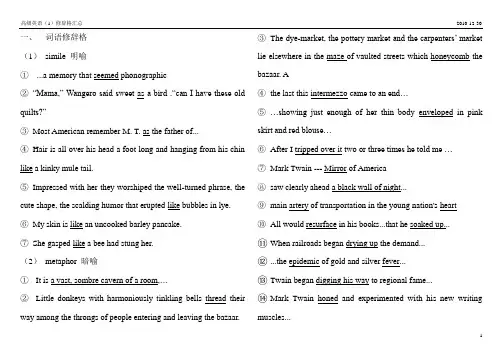
一、词语修辞格(1)simile 明喻①...a memory that seemed phonographic②“Mama,” Wangero said sweet as a bird .“can I have these old quilts?”③Most American remember M. T. as the father of...④Hair is all over his head a foot long and hanging from his chin like a kinky mule tail.⑤Impressed with her they worshiped the well-turned phrase, the cute shape, the scalding humor that erupted like bubbles in lye.⑥My skin is like an uncooked barley pancake.⑦She gasped like a bee had stung her.(2)metaphor 暗喻①It is a vast, sombre cavern of a room,…②Little donkeys with harmoniously tinkling bells thread their way among the throngs of people entering and leaving the bazaar. ③The dye-market, the pottery market and the carpenters’ market lie elsewhere in the maze of vaulted streets which honeycomb the bazaar. A④the last this intermezzo came to an end…⑤…showing just enough of her thin body enveloped in pink skirt and red blouse…⑥After I tripped over it two or three times he told me …⑦Mark Twain --- Mirror of America⑧saw clearly ahead a black wall of night...⑨main artery of transportation in the young nation's heart⑩All would resurface in his books...that he soaked up...⑪When railroads began drying up the demand...⑫...the epidemic of gold and silver fever...⑬Twain began digging his way to regional fame...⑭Mark Twain honed and experimented with his new writing muscles...⑮The Duchess of Croydon kept firm, tight rein on her racing mind.⑯Her voice was a whiplash.⑰and launch this cataract of horrors upon mankind…⑱But all this fades away before the spectacle which is now unfolding.⑲I see the German bombers and fighters in the sky, still smarting from many a British whipping, delighted to find what they believe is an easier and a safer prey.⑳I see the Russian soldiers standing on the thresthold of their native land, guarding the fields which their fathers have tilled from time immemorial.21The Nazi regime is devoid of all theme and principle except appetite and racial domination.22I suppose they will be rounded up in hordes.23We shall fight him by land, we shall fight him by sea, we shall fight him in the air, until, with God’s help, we have rid the earth of his shadow and liberated its peoples from his yoke.(3)metonymy 借代,转喻①In short, all of these publications are written in the language that the Third International describes②The Washington Post, in an editorial captioned "Keep Your Old Webster's"(4)synecdoche 提喻①The case had erupted round my head②The case had erupted round my head Or what of those sheets and jets of air that are now being used, in place of old-fashioned oak and hinges ...③But neither his vanity nor his purse is any concern of the dictionary's(5)personification 拟人①…until you round a corner and see a fairyland of dancing flashes…②Every here and there, a doorway gives a glimpse of a sunlit courtyard, perhaps before a mosque or a caravanserai, where camels lie disdainfully chewing their hay…③...to literature's enduring gratitude...④The grave world smiles as usual...⑤Bitterness fed on the man...⑥America laughed with him.⑦Personal tragedy haunted his entire life.(6)transferred epithet 移就①Darrow had whispered throwing a reassuring arm round my shoulder②The obese body shook in an appreciative chuckle.③Two high points of color appeared in the paleness of the Duchess of Croydon’s cheeks.④I have been exhilarated by two days of storms, but above all I love these long purposeless days in which I shed all that I have ever been. (V. Sackville-West, No Signposts in the Sea)(7)hyperbole 夸张①The roadway is about twelve feet wide, but it is narrowed every few yards by little stalls where goods of every conceivable kind are sold.②I feel my whole face warming from the heat waves it throws out.③If Hitler invaded Hell and would make at least a favorable reference to the Devil in the House of Commons.④I see the ten thousand villages of Russia where the means of existence is wrung so hardly from the soil, but where there are still primordial human joys, where maidens laugh and children play. ⑤...cruise through eternal boyhood and ...endless summer of freedom...⑥The cast of characters... - a cosmos.⑦America laughed with him.⑧The trial that rocked the world⑨His reputation as an authority on Scripture is recognized throughout the world."(8)oxymoron 矛盾修饰法Dudley Field Malene called my conviction a, "victorious defeat. " (9)euphemism 委婉语①… a motley band of Confederate g uerrillas who diligently avoided contact with the enemy.②...men's final release from earthly struggle(10)irony -- the use of words to express something different from and often opposite to their literal meaning. 反语用词语表达与它们的字面意思相异或相反的用法①Hiroshima—the “liveliest” city in Japan②“Maggie’s brain is like an elephant’s”. Wangero said, laughing .③… until we are marching backwards to the glorious age of the sixteenth century(11)sarcasm -- a cutting, often ironic remark intended to wound. 讽刺,挖苦意在伤害他人的尖刻的,常带讽刺意味的话语①My friend the attorney-general says that John Scopes knows what he is here for," Darrow drawled. "I know what he is here for, too. He is here because ignorance and bigotry(顽固) are, and it is a mighty strong combination.②There is some doubt about that.③a concept of how things get written that throws very little light on Lincoln but a great deal on Life④the Post’ s editorial fails to explain what is wrong with the definition, we can only infer from "so simple" a thing that the writer takes the plain, downright, man-in-the-street attitude that adoor is a door and any damn fool knows that(12)ridicule(嘲笑)Words or actions intended to evoke contemptuous laughter at or feelings toward a person or thing 愚弄有意激起对某人或某事的蔑视的笑或看不起的感情而说的话或做的事①Bryan, ageing and paunchy, was assisted②Resolutely he strode to the stand, carrying a palm fan like a sword to repel his enemies.③Bryan mopped his bald dome in silence.(13)pun 双关①DARWIN IS RIGHT – INSIDE.②Benjamin Franklin: “If we don’t hang together, we shall most assuredly hang separately.” (Peter stone and Sherman Edwards. 1776) 如果我们不能紧密地团结在一起,那就必然分散地走上绞刑架。
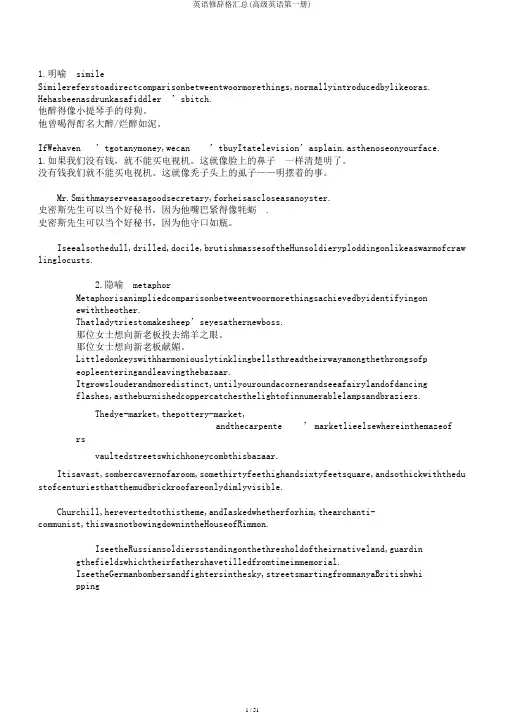
1.明喻simileSimilereferstoadirectcomparisonbetweentwoormorethings,normallyintroducedbylikeoras. Hehasbeenasdrunkasafiddler ’sbitch.他醉得像小提琴手的母狗。
他曾喝得酊名大醉/烂醉如泥。
IfWehaven ’tgotanymoney,wecan’tbuyItatelevision’asplain.asthenoseonyourface.1.如果我们没有钱,就不能买电视机。
这就像脸上的鼻子一样清楚明了。
没有钱我们就不能买电视机。
这就像秃子头上的虱子——明摆着的事。
Mr.Smithmayserveasagoodsecretary,forheisascloseasanoyster.史密斯先生可以当个好秘书,因为他嘴巴紧得像牦蛎.史密斯先生可以当个好秘书,因为他守口如瓶。
Iseealsothedull,drilled,docile,brutishmassesoftheHunsoldieryploddingonlikeaswarmofcraw linglocusts.2.隐喻metaphorMetaphorisanimpliedcomparisonbetweentwoormorethingsachievedbyidentifyingonewiththeother.Thatladytriestomakesheep’seyesathernewboss.那位女士想向新老板投去绵羊之眼。
那位女士想向新老板献媚。
Littledonkeyswithharmoniouslytinklingbellsthreadtheirwayamongthethrongsofpeopleenteringandleavingthebazaar.Itgrowslouderandmoredistinct,untilyouroundacornerandseeafairylandofdancingflashes,astheburnishedcoppercatchesthelightofinnumerablelampsandbraziers.Thedye-market,thepottery-market,’marketlieelsewhereinthemazeofandthecarpentersvaultedstreetswhichhoneycombthisbazaar.Itisavast,sombercavernofaroom,somethirtyfeethighandsixtyfeetsquare,andsothickwiththedu stofcenturiesthatthemudbrickroofareonlydimlyvisible.Churchill,herevertedtothistheme,andIaskedwhetherforhim,thearchanti-communist,thiswasnotbowingdownintheHouseofRimmon.IseetheRussiansoldiersstandingonthethresholdoftheirnativeland,guardin gthefieldswhichtheirfathershavetilledfromtimeimmemorial.IseetheGermanbombersandfightersinthesky,streetsmartingfrommanyaBritishwhippingButallthisfadesawaybeforethespectaclewhichisnowunfolding.tofindwhattheybelieveisaneasierandasaferprey.3.借代metonymyThereisamixtureofthetigerandtheapeinthecharacterofaFrenchman.法国人的性格中混合有老虎和猿的成分。
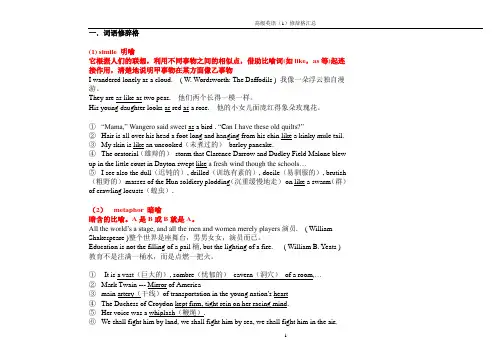
一.词语修辞格(1) simile 明喻它根据人们的联想,利用不同事物之间的相似点,借助比喻词(如like,as等)起连接作用,清楚地说明甲事物在某方面像乙事物I wandered lonely as a cloud. ( W. Wordsworth: The Daffodils ) 我像一朵浮云独自漫游。
They are as like as two peas. 他们两个长得一模一样。
His young daughter looks as red as a rose. 他的小女儿面庞红得象朵玫瑰花。
①―Mama,‖ Wangero said sweet as a bird . ―C an I have these old quilts?‖②Hair is all over his head a foot long and hanging from his chin like a kinky mule tail.③My skin is like an uncooked(未煮过的)barley pancake.④The oratorial(雄辩的)storm that Clarence Darrow and Dudley Field Malone blew up in the little court in Dayton swept like a fresh wind though the schools…⑤I see also the dull(迟钝的), drilled(训练有素的), docile(易驯服的), brutish (粗野的)masses of the Hun soldiery plodding(沉重缓慢地走)on like a swarm(群)of crawling locusts(蝗虫).(2)metaphor 暗喻暗含的比喻。
A是B或B就是A。
All the world’s a stage, and all the men and women merely players演员. ( William Shakespeare )整个世界是座舞台,男男女女,演员而已。
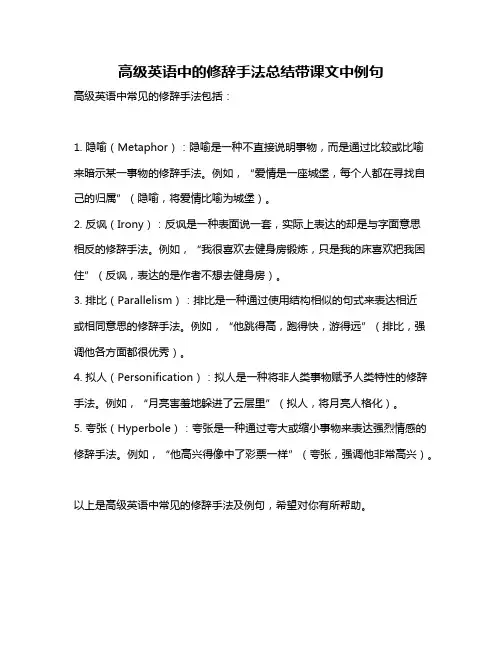
高级英语中的修辞手法总结带课文中例句
高级英语中常见的修辞手法包括:
1. 隐喻(Metaphor):隐喻是一种不直接说明事物,而是通过比较或比喻来暗示某一事物的修辞手法。
例如,“爱情是一座城堡,每个人都在寻找自己的归属”(隐喻,将爱情比喻为城堡)。
2. 反讽(Irony):反讽是一种表面说一套,实际上表达的却是与字面意思
相反的修辞手法。
例如,“我很喜欢去健身房锻炼,只是我的床喜欢把我困住”(反讽,表达的是作者不想去健身房)。
3. 排比(Parallelism):排比是一种通过使用结构相似的句式来表达相近
或相同意思的修辞手法。
例如,“他跳得高,跑得快,游得远”(排比,强调他各方面都很优秀)。
4. 拟人(Personification):拟人是一种将非人类事物赋予人类特性的修辞手法。
例如,“月亮害羞地躲进了云层里”(拟人,将月亮人格化)。
5. 夸张(Hyperbole):夸张是一种通过夸大或缩小事物来表达强烈情感的修辞手法。
例如,“他高兴得像中了彩票一样”(夸张,强调他非常高兴)。
以上是高级英语中常见的修辞手法及例句,希望对你有所帮助。
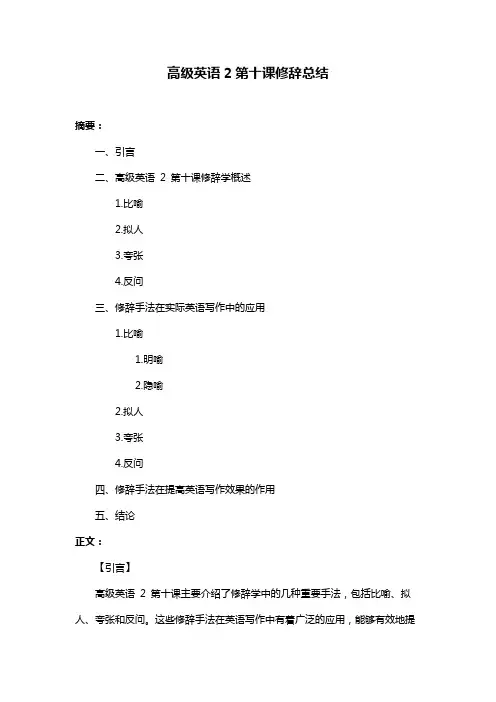
高级英语2第十课修辞总结摘要:一、引言二、高级英语2 第十课修辞学概述1.比喻2.拟人3.夸张4.反问三、修辞手法在实际英语写作中的应用1.比喻1.明喻2.隐喻2.拟人3.夸张4.反问四、修辞手法在提高英语写作效果的作用五、结论正文:【引言】高级英语2 第十课主要介绍了修辞学中的几种重要手法,包括比喻、拟人、夸张和反问。
这些修辞手法在英语写作中有着广泛的应用,能够有效地提高文章的表达效果和吸引力。
【高级英语2 第十课修辞学概述】修辞学是语言学的一个分支,主要研究如何运用各种语言手段来增强语言表达的效果。
在第十课中,我们主要学习了以下四种修辞手法:1.比喻:通过将两种本质上不同的事物进行类比,以形象生动的方式表达抽象的概念。
比喻可以分为明喻和隐喻两种。
2.拟人:将无生命的事物赋予生命和人的特征,使其具有感情、动作等。
3.夸张:对某一事物的特点进行夸大描述,以突出表现其特性。
4.反问:提出一个问题,但实际上并不需要对方回答,其目的是为了加强语气,表达说话者的观点。
【修辞手法在实际英语写作中的应用】在英语写作中,我们可以灵活运用这些修辞手法来提高文章的表达效果。
以下是一些实例:1.比喻:例如,“时间是金钱”,通过将时间和金钱进行类比,形象地表达了时间的宝贵。
2.拟人:例如,“月亮羞涩地躲在云朵后面”,将月亮赋予了人的情感和动作。
3.夸张:例如,“他饿得能吃下一头牛”,夸张地描述了他的饥饿程度。
4.反问:例如,“这难道不是一件很明显的事情吗?”通过反问加强语气,表达说话者的观点。
【修辞手法在提高英语写作效果的作用】修辞手法的运用可以使文章更加生动、有趣,增强读者的阅读兴趣。
同时,修辞手法还能够有效地传达作者的情感和观点,使文章更具说服力。
因此,学习和掌握修辞手法对于提高英语写作水平具有重要意义。
【结论】总之,高级英语2 第十课为我们介绍了四种重要的修辞手法:比喻、拟人、夸张和反问。
在英语写作中,我们可以灵活运用这些修辞手法来提高文章的表达效果和吸引力。
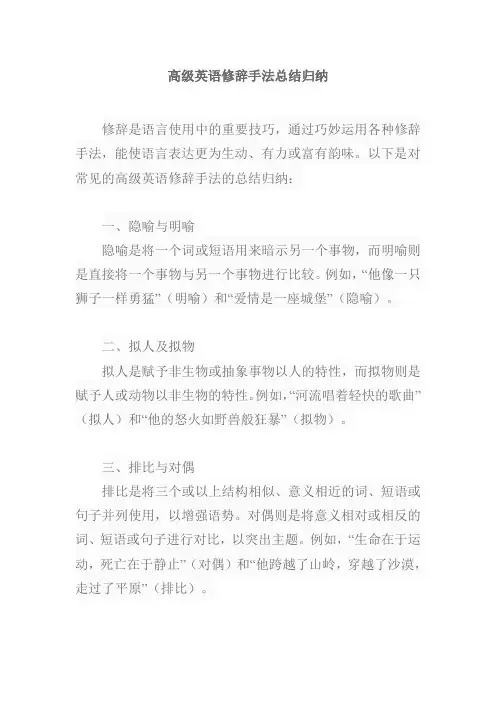
高级英语修辞手法总结归纳修辞是语言使用中的重要技巧,通过巧妙运用各种修辞手法,能使语言表达更为生动、有力或富有韵味。
以下是对常见的高级英语修辞手法的总结归纳:一、隐喻与明喻隐喻是将一个词或短语用来暗示另一个事物,而明喻则是直接将一个事物与另一个事物进行比较。
例如,“他像一只狮子一样勇猛”(明喻)和“爱情是一座城堡”(隐喻)。
二、拟人及拟物拟人是赋予非生物或抽象事物以人的特性,而拟物则是赋予人或动物以非生物的特性。
例如,“河流唱着轻快的歌曲”(拟人)和“他的怒火如野兽般狂暴”(拟物)。
三、排比与对偶排比是将三个或以上结构相似、意义相近的词、短语或句子并列使用,以增强语势。
对偶则是将意义相对或相反的词、短语或句子进行对比,以突出主题。
例如,“生命在于运动,死亡在于静止”(对偶)和“他跨越了山岭,穿越了沙漠,走过了平原”(排比)。
四、反复与交错反复是将相同的词、短语或句子重复使用,以强调某种情感或主题。
交错则是将不同的词、短语或句子相互交替使用,以达到特定的表达效果。
例如,“永远、永远、永远不要放弃”(反复)和“是与否,对与错”(交错)。
五、借代与提喻借代是用一个事物的某一部分来代替整体或其他部分,而提喻则是用整体来代替某一部分或用类属来代替个体。
例如,“我要用笔墨写下永恒”(借代)和“人是一本书”(提喻)。
六、反讽与戏谑反讽是通过说反话或正话反说来达到讽刺的效果,戏谑则是用幽默诙谐的语言来戏弄或嘲笑某人或某事。
例如,“他是一个天生的傻瓜”(反讽)和“爱情是人生的蜜糖”(戏谑)。
七、矛盾修辞法矛盾修辞法是将相互矛盾的概念或形象结合在一起,以引起读者的思考或表达复杂的情感。
例如,“孤独的狂欢”,“死亡的生命”。
八、头韵与脚韵头韵是使用相同或相似的音韵开头,脚韵是使用相同或相似的音韵结尾。
例如,“美丽的美女”(头韵)和“生活是一首歌”(脚韵)。
九、夸张与弱化夸张是通过夸大事实或形象来强调某种情感或主题,弱化则是通过缩小事实或形象来淡化某种情感或主题。
一、词语修辞格(1)simile 明喻①...a memory that seemed phonographic②Most American remember M. T. as the father of...(2)metaphor 暗喻①the last this intermezzo came to an end…②Mark Twain --- Mirror of America③saw clearly ahead a black wall of night...④main artery of transportation in the young nation's heart⑤All would resurface in his books...that he soaked up...⑥When railroads began drying up the demand...⑦...the epidemic of gold and silver fever...⑧Twain began digging his way to regional fame...⑨Mark Twain honed and experimented with his new writing muscles...⑩The Duchess of Croydon kept firm, tight rein on her racing mind.⑪and launch this cataract of horrors upon mankind…⑫I see the German bombers and fighters in the sky, still smarting from many a British whipping, delighted to find what they believe is an easier and a safer prey.⑬I see the Russian soldiers standing on the thresthold of their native land, guarding the fields which their fathers have tilled from time immemorial.⑭The Nazi regime is devoid of all theme and principle except appetite and racial domination.⑮I suppose they will be rounded up in hordes.⑯We shall fight him by land, we shall fight him by sea, we shall fight him in the air, until, with God’s help, we have rid the earth of his shadow and liberated its peoples from his yoke.(3)metonymy 借代,转喻(4)synecdoche 提喻①The case had erupted round my head(5)personification 拟人①...to literature's enduring gratitude...②The grave world smiles as usual...③Bitterness fed on the man...④America laughed with him.⑤Personal tragedy haunted his entire life.(6)transferred epithet 移就①Darrow had whispered throwing a reassuring arm round my shoulder②The obese body shook in an appreciative chuckle.③Two high points of color appeared in the paleness of the Duchess of Croydon’s cheeks.(7)hyperbole 夸张①If Hitler invaded Hell and would make at least a favorable reference to the Devil in the House of Commons.②...cruise through eternal boyhood and ...endless summer of freedom...③The cast of characters... - a cosmos.④America laughed with him.⑤The trial that rocked the world⑥His reputation as an authority on Scripture is recognized throughout the world."(8)oxymoron 矛盾修饰法Dudley Field Malene called my conviction a, "victorious defeat. "(9)euphemism 委婉语①… a motley band of Confederate guerrillas who diligently avoided contact with the enemy.②...men's final release from earthly struggle(10)irony -- the use of words to expresssomething different from and often opposite to theirliteral meaning. 反语用词语表达与它们的字面意思相异或相反的用法①Hiroshima—the ―liveliest‖ city in Japan②… until we are marching backwards to the glorious age of the sixteenth century(11)sarcasm -- a cutting, often ironic remarkintended to wound. 讽刺,挖苦意在伤害他人的尖刻的,常带讽刺意味的话语①There is some doubt about that.(12)pun 双关①DARWIN IS RIGHT – INSIDE.二、结构修辞格(13)antithesis 对比①Any man or state who fights on against Nazidom will have our aid. Any man or state who marches with Hitler is our foe…②"The Christian believes that man came from above. The evolutionist believes that he must have come from below③...between what people claim to be and what they really are.④...took unholy verbal shots at the Holy Land...⑤...a world which will lament them a day and forget them forever(14)rhetorical question 修辞疑问句①Was I not at the scene of the crime?②Who ever knew a Johnson with a quick tongue? Who can even imagine me looking a strange white man in the eye?③In what conceivable way does our car concern you?三、音韵修辞格(15)头韵法(alliteration)在文句中有两个以上连结在一起的词或词组,其开头的音节有同样的字母或声音,以增强语言的节奏感。
I. Phonetic Devices语音修辞1.Onomatopoeia(拟声): The use of words that imitate the sounds associated with the objects or actions they refer to.例:As you approach it, a tinkling and banging and clashing begins to impinge on your ear.All was quiet again in Han Mansion except for some people snoring, the horse chewing mash, and geese crackling at intervals.I can hear the water splashing, the bees humming, and the frogs croaking.2.Alliteration(头韵): It has to do with the sound rather than the sense of words for effect. It is a device that repeats the same sound at frequent intervals and since the sound repeated is usually the initial consonant sound, it is also called “front rhyme”.例:The f air b reeze b lew, \the white f oam f lew, \The f urrow f ollowed f ree; \We were the f irst that ever burst \into that s ilent s ea.M oney m akes the m are go. A good f ame is better than a good f ace.3.Consonance (辅韵):It refers to the repetition of the same consonants in the end of a group of words. (一组词,一句话或一行诗歌中,相同的词尾辅音重复出现)例1:He laughs be st who laughs la st.例2:With his three hundred wag ingThe battle, long he stoo d.And like a lion rag ing,Expires in seas of bloo d. (此处也称诗歌的rhyme)4.Homoeotoleuton (谐缀), meaning similarity of endings, refers to the use of identical or similar sounding suffixes (后缀) on the final words of phrases or clauses. Homoeotoleuton is usually used in a verse but it also has a wonderful effect in a prose.例:There is no secur ity but opportun ity on this earth.I need time to dr ink but I need more time to th ink.Education is not rec eived but ach ieved.5.Assonance(半谐音):Assonance is the repetition of similar vowel sounds, preceded and followed by different consonants, in the stressed syllables of adjacent words.例:All r oa ds lead to R o me.A c i ty that is set on a h i ll cannot be h i d.城造在山上,是不能隐藏的。
Lesson one1 We can batten down and ride it out.—metaphor2. Wind and rain now wiped the house. ----metaphor(暗喻)3 Everybody out the back door to the cars!--elliptical sentence (省略句)4. The children went fro m adult to adult like buckets in a fire brigade. ----si mile (明喻)5. But the cars wouldn’t start; the electrical systems had been killed by water. personification(拟人)6. The wind sounded like the roar of a train passing a few yards away. -----simile7. …it seized a 600,00 gallon Gulfport oil tan k and dumped it 3.5 miles away. ----personification(拟人)8 Telephone poles and 20-inch-thick pines cracked like guns as the winds snapped them.-simile9 Several vacationers at the luxurious Richelieu Apartments there held a hurricane party to watch the sto rm fro m their spectacular vantagepoint--transferred epithet10. Richelieu Apartments were smashed apart as if by a gigantic fist, and 26 people perished. 明喻11. Strips of clothing festooned the standing trees, and blown down power lines coiled like black spaghetti over the roads----metaphor; simile12. …the Salvation Army’s canteen trucks and Red Cross volunteers and staffers were going wherever possible to distribute hot drinks, food, clothing and bedding.Lesson two Marrakech1 The little crowd of mourners -- all men and boys, no women--threaded their way across the market place between the piles of pomegranates and the taxis and the camels, walling a short chant over and over again. (Elliptical sentence省略句)2 提喻or are they merely a kind of undifferentiated brown stuff, about as individual as bees or coral insects?3 押头韵They rise out of the earth, they sweat and starve for a few years, and then they sink back into the nameless mounds of the gr aveyard (Para 3)4间接请求I could eat some o f that bread.5夸张移就暗喻A carpenter sits cross-legged at a prehistoric lathe, turning chair-legs at lightning speed.(Transferred epithet移就Metaphor暗喻)6移就暗喻Instantly, fro m the dark holes all round, there was a frenzied rush of Jews. (Transferred epithet 移就)7 类比in just the same way, a couple of hundred years ago, poor old women used to be burned for witchcraft when they could not even work enough magic to get themselves a square meal.7 提喻still, a white skin is always fairly conspicuous.8 明喻long lines of women, bent double like inverted capital Ls.9 暗喻she accepted her status as an old woman, that is to say as a beast of burden.10 拟声词Ono matopoeia as the strokes flew northward the Negroes were marching southward -a long, dusty column, infantry, screw- gun batteries, and then more infantry, four or five thousand men in all, winding up the road with a clumping of boots and a clatter of iron wheels.11 明喻their feet squashed into boots that looks like blocks of wood…Simile12 省略句Not hostile, not contemptuous, not sullen, not even inquisitive13 明喻And really it was like watching a flock of cattle to see the long column, a mile or two miles of armed men, flowing peacefull y up the road, while the great white birds drifted over them in the opposite direction, glittering like scrapes of paper.Lesson threeMetaphor(暗喻)1 the conversation had swung from Australian convicts of the 19th century to the english peasants of the 12th century.2 the conversation was on wings.3.And no one has any idea where it will go as it meander or leaps and sparkles or just glows .——mixed metaphor4The fact that their marriages may be on the rocks,or that their love affairs have been broken or even that they got out of bed on the wrong side is simply not a concern.——metaphor【1.on the rock 为英语习语,这里引用了隐喻的修辞手法,把婚姻比喻成触礁的船只】【2.to get out of the bed on the wrong side 也是英语习语。
高级英语第三版本册1-7课修辞整理
修辞(Rhetoric)是指修词造句的艺术,旨在使文章表达更加
生动、准确。
在英语写作中,修辞手法的运用可以为文本增添色彩
并强化文章逻辑。
以下是本文对高级英语第三版本册1-7课修辞手
法的整理:
1. 比喻(Metaphor):通过将两种不同的事物进行比较来强化
表达。
例:“你是我的太阳”(You are my sunshine)。
2. 拟人(Personification):将非人事物拟人化,使其表现出人
类的特性。
例:“阳光明媚”(The sunshine smiled upon us)。
3. 讽刺(Irony):用反语强调与实际相反的意思。
例:“我今
天看起来真好看,唯一的问题是我感冒了”(I look amazing today. The only problem is that I have a cold.)。
6. 借代(Metonymy):用一个相关的单词或短语来替代原文,起到简洁的效果。
例:“冠军”(champion)代表整个团队获胜。
7. 倍受争议的说法(Euphemism):用含蓄、委婉和微妙的词语或说法来表达直接或难以接受的事情。
例:“真是一个有趣的人”(He is quite a character)。
以上是高级英语第三版本册1-7课修辞手法整理,希望对大家的英语写作有所帮助。
高级英语1修辞手法汇总修辞手法是英语写作中常用的一种技巧,通过运用修辞手法可以使文章更加生动、富有表现力,增强读者的阅读体验。
在高级英语写作中,修辞手法的运用尤为重要,它可以为文章赋予深度和风格,并提升文章的艺术性和说服力。
下面将介绍几种常见的修辞手法。
一、比喻(Metaphor)比喻是一种通过将一个事物与另一个事物相比较,以便更好地说明或形容某个概念或主题的修辞手法。
它常常用于描述抽象的概念,使之变得更加具体和形象。
例句:1. He is a lion in the battlefield.2. Her smile was a ray of sunshine on a cloudy day.二、拟人(Personification)拟人是一种将非人类的事物或抽象的概念赋予人类的特征和行为的修辞手法。
通过将这些非人类的事物拟人化,可以使文章更生动有趣,增强读者对其中事物的感知和理解。
例句:1. The wind whispered through the trees.2. The flowers danced in the breeze.三、夸张(Hyperbole)夸张是一种通过夸大事物的特征或情况来强调其重要性或影响力的修辞手法。
它常用于诗歌、演讲或幽默作品中,以引起读者的兴趣和共鸣。
例句:1. I've told you a million times not to do that!2. The line for the new iPhone was a mile long.四、反问(Rhetorical question)反问是一种不需要回答的问题,用于引起读者的思考或表达某种意义的修辞手法。
通过将一个问题直接提出,可以引起读者的兴趣和注意,并激发其对文章主题的思考。
例句:1. Do you really think I would believe such a ridiculous story?2. Can you imagine a world without music?五、排比(Parallelism)排比是一种通过重复并列的结构或类似的语法结构来增加修辞效果的修辞手法。
英语修辞手法1、Simile明喻明喻就是将具有共性得不同事物作对比、这种共性存在于人们得心里,而不就是事物得自然属性.标志词常用like, as, seem, as if, as though, similar to, such as 等。
例如:1>。
He waslike acock who thoughtthe sunhad risento hear him crow、2>、I wanderedlonely asa cloud。
3>。
Einstein only had a blanketon, as ifhe had just walkedou tofafairy tale、2。
Metaphor 隐喻,暗喻隐喻就是简缩了得明喻,就是将某一事物得名称用于另一事物,通过比较形成。
例如:1〉。
Hope isa good breakfast, but itis a badsupper、2>.Some books are to be tasted, othersswallowed, andsome few to bechewed and digested。
3、Metonymy借喻,转喻借喻不直接说出所要说得事物,而使用另一个与之相关得事物名称、I。
以容器代替内容,例如:1>。
The kettleboils、水开了、2〉。
Theroom sat silent、全屋人安静地坐着。
II。
以资料、工具代替事物得名称,例如:Lend me your ears, please.请听我说、III.以作者代替作品,例如:a plete Shakespeare 莎士比亚全集VI、以具体事物代替抽象概念,例如:Ihadthe muscle, andthey made money out of it、我有力气,她们就用我得力气赚钱。
4、Synecdoche 提喻提喻用部分代替全体,或用全体代替部分,或特殊代替一般、例如:1>。
Rhetorical Devices一、明喻(simile )是以两种具有相同特征的事物和现象进行对比,表明本体和喻体之间的相似关系,两者都在对比中出现。
常用比喻词like, as, as if, as though等,例如:1、This elephant is like a snake as anybody can see.这头象和任何人见到的一样像一条蛇。
2、He looked as if he had just stepped out of my book of fairytales and had passed me like a spirit.他看上去好像刚从我的童话故事书中走出来,像幽灵一样从我身旁走过去。
3、It has long leaves that sway in the wi nd like slim fin gers reach ing to touch someth ing.它那长长的叶子在风中摆动,好像伸出纤细的手指去触摸什么东西似的。
二、隐喻(metaphor )这种比喻不通过比喻词进行,而是直接将用事物当作乙事物来描写,甲乙两事物之间的联系和相似之处是暗含的。
1、German guns and German planes rained down bombs, shells and bullets... 德国人的枪炮和飞机将炸弹、炮弹和子弹像暴雨一样倾泻下来。
2、The diamond department was the heart and center of the store.钻石部是商店的心脏和核心。
三、Allusi on (暗引)其特点是不注明来源和出处,一般多引用人们熟知的关键词或词组,将其融合编织在作者的话语中。
引用的东西包括典故、谚语、成语、格言和俗语等。
英语引用最多的是源出《圣经》故事以及希腊、罗马神话、《伊索寓言》和那些源远流长的谚语、格言等。
例如:1、Grammar may be his heel of Achilles.语法是他的大弱点。
(Achill es 是希腊神话中的一位勇士。
除了脚踵处,他身上其他地方刀枪不入。
)2、The project is an economic albatross from the start.这个项目从一开始就是一个摆脱不了的经济难题。
(Albatross是英国诗人柯勒律治的《古舟子咏》中的信天翁,它被忘恩负义的水手杀死后,全船陷入灾难中。
)四、提喻(synecdoche )又称举隅法,主要特点是局部代表全体,或以全体喻指部分,或以抽象代具体,或以具体代抽象。
例如:1、The Great Wall was made not only of stones and earth, but of the flesh and bloodof millio ns of men.长城不仅是用石头和土建造的,而且是用几百万人的血和肉建成的。
句中的“the flesh and blood 喻为“thegreat sacrifice (巨大的牺牲)2、“ ...saying that it was the most beautiful tongue in the world,...……他说这是世界上最美的语言。
这里用具体的“tongue代替抽象的“Ianguage。
”3、Many eyes turned to a tall,20 —year black girl on the U.S. team.很多人将眼光投向美国队一个高高的20岁的黑姑娘。
这里的“ many eyes代替了“ many persons ”五、转喻/借代(metonymy )是指两种不同事物并不相似,但又密不可分,因而常用其中一种事物名称代替另一种。
1、Several years later, word came that Napoleonyh himself was coming to in spect them...几年以后,他们听说拿破仑要亲自来视察他们。
“ word在这里代替了“news, information (消息、信息)2、Al spoke with his eyes, “ yes ”.艾尔用眼睛说,是的”说”应该是嘴的功能,这里实际上是用眼神表达了说话的意思”。
六、拟人(personification )这种修辞方法是把人类的特点、特性加于外界事物之上,使之人格化,以物拟人,以达到彼此交融,合二为一。
1、Necessity is the mother of invention.需要乃是发明之母。
2、She is the favoured child of Fortune 她是幸运之宠儿。
两句中名词mother和child通常用于人,而这里分别用于无生命的名词invention 和Fortune,使这两个词拟人化了。
七、夸张(hyperbole )这是运用丰富的想象,过激的言词,渲染和装饰客观事物,以达到强调的效果。
1、My blood froze. 我的血液都凝固了。
2、When I told our father about this, his heart burst. 当我将这件事告诉我们的父亲时,他的心几乎要迸出来。
3、My heart almost stopped beat ing whe n I heard my daughter voice "on the phone.从电话里一听到我女儿的声音,我的心几乎停止跳动。
八、Un derstateme nt:(含蓄陈述)It is the opposite of hyperbole, or overstatement. It achieves its effect of emphasizinga fact by deliberately understating it, impressing the listener or the reader more by what is merely implied or left unsaid than by bare stateme nt.1、It is no laughing matter.九、双关语(pun )是以一个词或词组,用巧妙的办法同时把互不关联的两种含义结合起来,以取得一种诙谐有趣的效果。
Napoleon was astonished. ” Either you are mad, or I am, he declared. “ Both sir! cried the Swede proudly.“ Both一词一语双关,既指拿破仑和这位士兵都是疯子,又指这位战士参加过拿破仑指挥的两次战役。
十、讽刺(irony )是指用含蓄的褒义词语来表示其反面的意义,从而达到使本义更加幽默,更加讽刺的效果。
Well, of course, I knew that gentlemen like you carry only large notes.啊,当然,我知道像你这样的先生只带大票子。
店员这句话意在讽刺这位穿破衣的顾客:像你这样的人怎么会有大票子呢?名为“gentlemen 实贝U “ beg gar 而已。
十^一、Euphemism (委婉修辞法)就是用转弯抹角的说法来代替直截了当的话,把原来显得粗鲁或令人尴尬的语言温和、含蓄地表达出来。
这在汉语中叫委婉语。
例如:用sanitation engineer 替代garbage man(清洁工)用the disadvantaged 替代the poor(穷人)用in dustrial actio n 替代strike(罢工)十二、Transferred epithet (移就/转类形容词)是采用表示性质和特征的形容词或相当于形容词的词来修饰、限定与它根本不同属性的名词。
这种修辞手法能与汉语中的移就基本相似。
例如:The doctor's face expressed a kind of doubti ng admirati on.(用"疑惑"修饰限定"钦佩")医生的脸上流露出钦佩而又带有疑惑的神情。
十三、矛盾修辞法(Oxymoron)用两种不相调和,甚至截然相反的特征来形容一项事物,在矛盾中寻求哲理,以便收到奇警的修辞效果,这就是矛盾修辞法,用这种方法,语言精炼简洁,富有哲理,并产生强大的逻辑力量,产生一种出人意料,引人入胜的效果。
例如:in bitter-sweet memories, orderly chaos(混舌L) and proud humility(侮辱).十四、仿拟(Parody)根据家喻户晓的成语或谚语,临时更换其中的某个部分,造成新的成语或谚语;或者根据古今名言警句,在保持其原句不变的情况下,更换其中部分词语,这种修辞方式叫仿拟。
1、To lie or not to lie-the doctor's dilemma(撒谎还是不撒谎 ---- 医生的难题)看到这个标题,我们不禁想起莎翁戏剧Hamlet中那个永远也解不透的句子“To beor not to be, that is the questi on 。
显然,文章的题目由此模仿而来,给人印象深刻。
2、Lady hermits who are down but not out( 穷困而不潦倒的女隐士们)文中的down but not out源于down and out,原是拳击比赛的术语,后来喻指穷困潦倒的人。
十五、An tithesis (对句、平行对照)它是把意义相反或相对的语言单位排列在平行、对称的结构里,以求取一种匀称的形式美和强烈的对照感。
An tithesis有两个特点:一是语义上的对照性,二是结构上的对称性。
因此,该辞格可看作是Parallelism(平行)与Contrast (对照)的结合,故译作平行对照”体现An tithesis的语言单位可分为两个层次,即词语和句子,所以又将An tithesis译为对语”对句”英语An tithesis形式整齐对称, 音律节奏铿锵,内容既适于反衬对照,又适于重复强调,在形、音、义各方面都具有鲜明的修辞功能。
An tithesis的使用能揭示事物的矛盾性,对照的语句往往说得巧妙机智,寓意深刻,蕴含着某种人生的哲理或真谛,常见于英语谚语、名言、演说及文学作品中。
例如:1、K nowledge makes humble , ignorance makes proud. (Proverb)有知使人谦卑,无知使人骄矜。
2、A pessimist is one who makes difficulties of his opportunities ; an optimist isone who makes opport un ities of his difficulties.悲观的人把机会变成困难;乐观的人将困难化为机会。